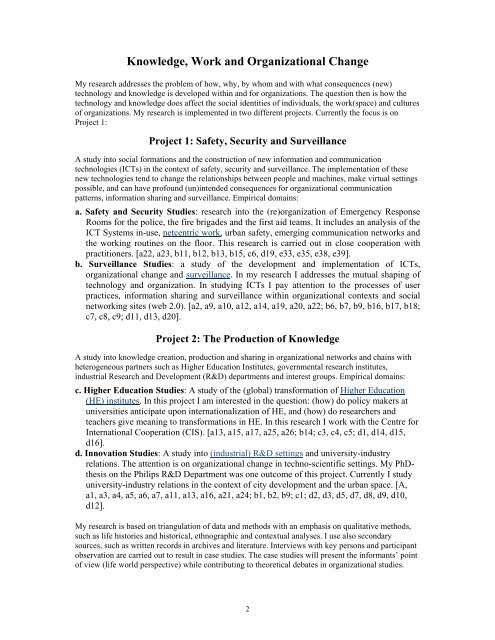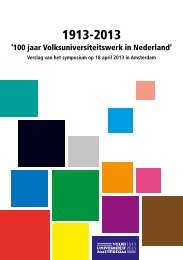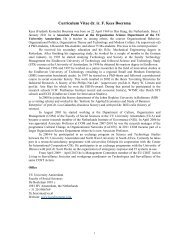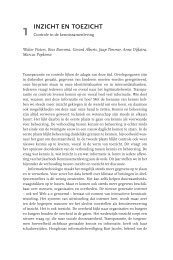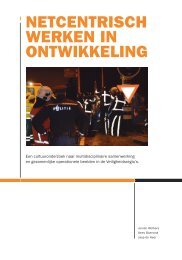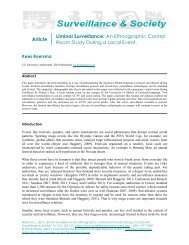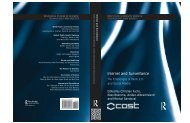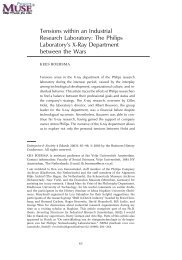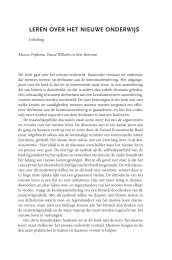Curriculum Vitae dr. ir. F. Kees Boersma
Curriculum Vitae dr. ir. F. Kees Boersma
Curriculum Vitae dr. ir. F. Kees Boersma
You also want an ePaper? Increase the reach of your titles
YUMPU automatically turns print PDFs into web optimized ePapers that Google loves.
Knowledge, Work and Organizational Change<br />
My research ad<strong>dr</strong>esses the problem of how, why, by whom and with what consequences (new)<br />
technology and knowledge is developed within and for organizations. The question then is how the<br />
technology and knowledge does affect the social identities of individuals, the work(space) and cultures<br />
of organizations. My research is implemented in two different projects. Currently the focus is on<br />
Project 1:<br />
Project 1: Safety, Security and Surveillance<br />
A study into social formations and the construction of new information and communication<br />
technologies (ICTs) in the context of safety, security and surveillance. The implementation of these<br />
new technologies tend to change the relationships between people and machines, make v<strong>ir</strong>tual settings<br />
possible, and can have profound (un)intended consequences for organizational communication<br />
patterns, information sharing and surveillance. Emp<strong>ir</strong>ical domains:<br />
a. Safety and Security Studies: research into the (re)organization of Emergency Response<br />
Rooms for the police, the f<strong>ir</strong>e brigades and the f<strong>ir</strong>st aid teams. It includes an analysis of the<br />
ICT Systems in-use, netcentric work, urban safety, emerging communication networks and<br />
the working routines on the floor. This research is carried out in close cooperation with<br />
practitioners. [a22, a23, b11, b12, b13, b15, c6, d19, e33, e35, e38, e39].<br />
b. Surveillance Studies: a study of the development and implementation of ICTs,<br />
organizational change and surveillance. In my research I ad<strong>dr</strong>esses the mutual shaping of<br />
technology and organization. In studying ICTs I pay attention to the processes of user<br />
practices, information sharing and surveillance within organizational contexts and social<br />
networking sites (web 2.0). [a2, a9, a10, a12, a14, a19, a20, a22; b6, b7, b9, b16, b17, b18;<br />
c7, c8, c9; d11, d13, d20].<br />
Project 2: The Production of Knowledge<br />
A study into knowledge creation, production and sharing in organizational networks and chains with<br />
heterogeneous partners such as Higher Education Institutes, governmental research institutes,<br />
industrial Research and Development (R&D) departments and interest groups. Emp<strong>ir</strong>ical domains:<br />
c. Higher Education Studies: A study of the (global) transformation of Higher Education<br />
(HE) institutes. In this project I am interested in the question: (how) do policy makers at<br />
universities anticipate upon internationalization of HE, and (how) do researchers and<br />
teachers give meaning to transformations in HE. In this research I work with the Centre for<br />
International Cooperation (CIS). [a13, a15, a17, a25, a26; b14; c3, c4, c5; d1, d14, d15,<br />
d16].<br />
d. Innovation Studies: A study into (industrial) R&D settings and university-industry<br />
relations. The attention is on organizational change in techno-scientific settings. My PhDthesis<br />
on the Philips R&D Department was one outcome of this project. Currently I study<br />
university-industry relations in the context of city development and the urban space. [A,<br />
a1, a3, a4, a5, a6, a7, a11, a13, a16, a21, a24; b1, b2, b9; c1; d2, d3, d5, d7, d8, d9, d10,<br />
d12].<br />
My research is based on triangulation of data and methods with an emphasis on qualitative methods,<br />
such as life histories and historical, ethnographic and contextual analyses. I use also secondary<br />
sources, such as written records in archives and literature. Interviews with key persons and participant<br />
observation are carried out to result in case studies. The case studies will present the informants’ point<br />
of view (life world perspective) while contributing to theoretical debates in organizational studies.<br />
2


